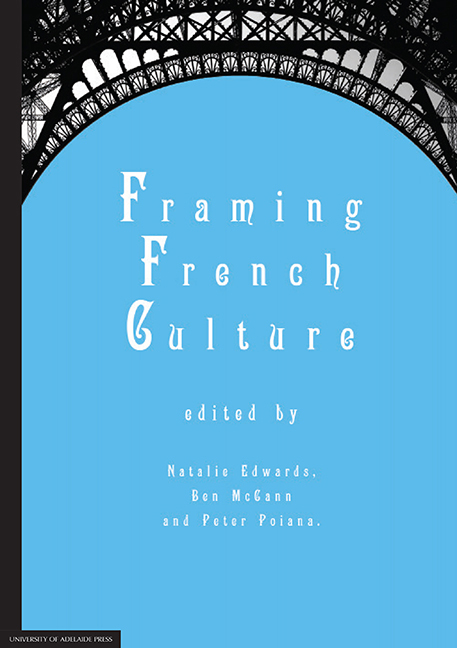Book contents
- Frontmatter
- Contents
- Introduction
- Part 1 Historical framings
- Part 2 Cultural icons and cinematic framings
- Part 3 Photographic framings
- 8 Annie Ernaux's phototextual archives: Ecrire la vie
- 9 The image of self-effacement: The revendication of the autonomous author in Marie NDiaye's Autoportrait en vert
- 10 Accumulating Algeria: Recurrent images in Pied-Noir visual works
- Part 4 Artistic framings
10 - Accumulating Algeria: Recurrent images in Pied-Noir visual works
from Part 3 - Photographic framings
Published online by Cambridge University Press: 05 February 2016
- Frontmatter
- Contents
- Introduction
- Part 1 Historical framings
- Part 2 Cultural icons and cinematic framings
- Part 3 Photographic framings
- 8 Annie Ernaux's phototextual archives: Ecrire la vie
- 9 The image of self-effacement: The revendication of the autonomous author in Marie NDiaye's Autoportrait en vert
- 10 Accumulating Algeria: Recurrent images in Pied-Noir visual works
- Part 4 Artistic framings
Summary
Upon losing their homeland at the end of the Algerian War of Independence in 1962, the community of Pieds-Noirs, or former French citizens of Algeria, set out to protect their fragile memories through literature, photography and film. Every year the communities gather together in France to commemorate their exodus, and each reunion is guided by images of colonial Algeria. As the ageing Pieds-Noirs assemble, so do fragments of their past: school photos endlessly emerge from Pieds-Noirs seeking to identify lost or forgotten classmates, and iconic Algerian monuments reappear in slide presentations, films, photodocumentaries, paintings and websites. The Pieds-Noirs are eager to collect each remnant from their homeland, and the visual pieces are among the most evocative. As these accumulated images represent an entire community's long absent home, and as many members contribute to the composite image of colonial Algeria, a process of layering and overlapping occurs. The representations of places become densely piled, heavy with consolidated meaning and multiple memories of places to such an extent that the image becomes larger than life.
Through an analysis of recurrent images of Algeria produced by its former French citizens, from photodocumentary to mixed-media artwork, I hope to make apparent that the visual layering of a colonial past progressively narrows what is remembered from the colony while solidifying specific landmarks. I will then attempt to demonstrate that rather than jogging, confronting or preserving memory, the accumulated images of Algeria distance the viewer from the reality of the past by compressing personal experience under communal memory.
In the Souvenirs de là-bas series of Algerian photodocumentary books, author Elisabeth Fechner expresses that, in spite of distortions, the photograph is the reality that endures through time: ‘La photo alors, la belle affaire. Floue? Surexposée? Mal cadrée? Vue du ciel? De trop loin? De trop près? Ce rêve d'un soir, allez savoir comment, restait à jamais fixé sur la pellicule’. Fechner's goal is to let the Pieds-Noirs compare and contrast their memories with the assembled images in her works dedicated to Algiers, Oran and Constantine. Each text begins with the same introductory call: come and see how your memories match up to these pictures. After all, this is all we have left. Fechner similarly collects images in broader works such as Le Pays d'où je viens: Souvenirs d'Algérie 1910-1962 (1999) and La Gloire de l'Algérie: Écrivains et photographes 1830-1960 (2000).
- Type
- Chapter
- Information
- Framing French Culture , pp. 209 - 228Publisher: The University of Adelaide PressPrint publication year: 2015



